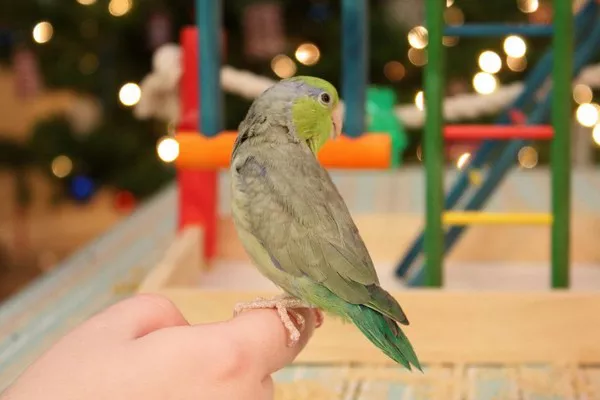The vibrant Sun Conure (Aratinga solstitialis), also known as the Sun Parakeet, is a small to medium-sized parrot admired for its dazzling yellow-orange plumage, playful nature, and lively personality. These birds are often described as affectionate, intelligent, and highly social, making them a popular choice as pets. However, like all birds, Sun Conures can exhibit aggressive behavior, which can be confusing and distressing for pet owners. This article explores the potential causes of aggression in Sun Conures, as well as effective ways to manage and prevent these behaviors.
Understanding Aggression in Sun Conures
Aggression in birds, including Sun Conures, can manifest in several ways. This might include biting, lunging, growling, feather ruffling, or even chasing their owners or other birds. In many cases, the behavior seems sudden or unprovoked, leaving bird owners perplexed about the reasons behind their bird’s aggression. To understand why a normally gentle Sun Conure may become aggressive, it is crucial to recognize that there are often complex underlying factors driving these behaviors. Aggression is rarely due to a single cause but rather a combination of environmental, social, and biological influences.
Territorial Instincts
Birds, including Sun Conures, are naturally territorial, especially in the wild. In their natural habitats, parrots defend their nests or feeding grounds from intruders to ensure their survival and that of their offspring. While a pet Sun Conure is far removed from its wild origins, these territorial instincts can remain strong. Sun Conures may become possessive of their cage, toys, or even a particular person, viewing them as their “territory.” If they perceive an intruder (whether another bird, pet, or human), they may become aggressive in defense of their space.
Signs of Territorial Aggression
When a Sun Conure exhibits territorial aggression, you may notice certain behaviors:
- The bird may become defensive of its cage or perch, biting or lunging when someone reaches inside.
- The Conure may growl, ruffle its feathers, or become visibly agitated if another pet or person approaches its cage.
- It may only show aggression towards specific individuals, often those it does not perceive as part of its “flock” (the people it feels bonded with).
Hormonal Changes During Breeding Season
Like many birds, Sun Conures experience hormonal fluctuations during their breeding season, which can lead to temporary changes in behavior. During this period, they may become more protective of their perceived nesting area, their mates, or their owners. In the wild, this behavior helps protect their young from potential threats. However, in a domestic environment, these hormonal surges can result in increased aggression towards humans or other pets, especially when the bird feels its breeding space is threatened.
Hormonal Triggers in Captivity
In captivity, hormonal behaviors are often triggered by factors such as:
Day length and light exposure: Longer daylight hours can signal to a Sun Conure’s body that it’s breeding season. Artificial lighting in homes may inadvertently extend the bird’s exposure to light, causing hormonal changes.
Nesting behavior: Providing soft bedding, blankets, or certain toys can encourage nesting behavior, which may exacerbate hormonal aggression.
Diet and environment: A high-calorie or nutrient-rich diet, as well as perceived security in the environment, can signal to the bird that it’s an appropriate time to breed.
During this time, aggression is a natural response driven by biological imperatives, and it may lessen or disappear once the bird’s breeding season is over.
Lack of Proper Socialization
Sun Conures are highly social animals and, in the wild, live in flocks. They thrive on interaction and communication, both with other birds and humans. However, inadequate socialization, especially during the early stages of life, can lead to behavioral issues, including aggression.
The Importance of Early Socialization
If a Sun Conure is not exposed to a variety of people, animals, and experiences during its formative weeks and months, it may develop fear or anxiety towards unfamiliar situations. This fear can manifest as aggression, particularly if the bird feels threatened or cornered. Birds that were hand-raised or poorly socialized may also exhibit possessiveness over their primary caregiver, becoming aggressive towards anyone else who tries to interact with them.
Sun Conures need consistent and positive interaction with different members of the household to ensure that they are well-adjusted and comfortable in a variety of situations. Without this, they may become defensive or aggressive when they feel overwhelmed or anxious.
Fear and Anxiety
Like humans, birds can become anxious or fearful in unfamiliar or stressful situations. If a Sun Conure feels threatened, it may resort to aggression as a means of self-defense. Fear-based aggression is often triggered by sudden changes in the environment, loud noises, or new people or animals in the home.
Common Triggers for Fear-Based Aggression
Some common triggers for fear-based aggression in Sun Conures include:
New or unfamiliar objects: Introducing new toys, furniture, or other items into the bird’s environment can cause fear.
Loud noises: Fireworks, thunderstorms, or loud appliances may startle a bird, leading to aggressive reactions.
Changes in routine: Birds thrive on routine, and significant changes in daily schedules can cause stress. Moving to a new house, the arrival of a new pet, or the departure of a family member can all contribute to anxiety in a Sun Conure.
When a bird is anxious, it may exhibit aggressive behaviors such as biting, lunging, or growling in an attempt to defend itself from what it perceives as a threat.
Health Issues
Aggression in birds can also be a sign of an underlying health problem. If a Sun Conure is experiencing pain or discomfort, it may lash out as a way to communicate that something is wrong. Health-related aggression can stem from a variety of issues, including injury, illness, or hormonal imbalances.
Medical Conditions That May Cause Aggression
Some health conditions that can lead to aggression in Sun Conures include:
Infections or injuries: Birds in pain from injuries or infections may become aggressive if touched or handled.
Nutritional deficiencies: A poor diet can lead to behavioral changes, including increased irritability or aggression.
Hormonal imbalances: As mentioned earlier, hormonal fluctuations during breeding season can cause temporary aggression. However, in some cases, chronic hormonal imbalances may result in ongoing aggression.
It is essential to rule out medical causes of aggression by consulting an avian veterinarian if a bird’s behavior changes suddenly or if the aggression persists.
Frustration and Boredom
Sun Conures are intelligent and highly active birds that require mental and physical stimulation. In the wild, they spend much of their time foraging for food, flying, and interacting with their flock. Pet birds, especially those kept in cages for long periods without enough enrichment, may become bored and frustrated. This can lead to behavioral issues, including aggression.
Signs of Frustration in Sun Conures
A bored or frustrated Sun Conure may exhibit:
- Repetitive behaviors, such as pacing or biting the cage bars.
- Increased vocalizations, including screaming or squawking.
- Destructive behaviors, such as chewing on furniture or toys.
- Aggressive outbursts, including biting or lunging at their owner.
Birds need regular opportunities to play, exercise, and engage in mentally stimulating activities. Without these outlets, frustration can build up and result in aggressive behaviors.
Addressing Aggression in Sun Conures
Once the underlying cause of a Sun Conure’s aggression is identified, it is possible to take steps to address and manage the behavior. Here are some effective strategies:
Create a Consistent Routine
Sun Conures thrive on routine, and consistency can help alleviate anxiety and reduce aggressive behaviors. Establish regular feeding times, playtimes, and sleeping schedules for your bird. Avoid making sudden changes to the bird’s environment or routine, as this can cause stress.
See Also: Why Do Sun Conures Scream So Much?
Provide Mental Stimulation and Physical Exercise
To prevent boredom and frustration, ensure your Sun Conure has plenty of opportunities for mental and physical stimulation. This can include:
- Offering a variety of toys, especially puzzle toys that encourage problem-solving.
- Providing foraging opportunities by hiding treats or food in toys or different parts of the cage.
- Allowing the bird to spend time outside of its cage in a safe, supervised environment.
- Engaging in regular training sessions using positive reinforcement techniques to keep the bird mentally stimulated.
Address Territoriality
If your Sun Conure is displaying territorial aggression, particularly around its cage, try to minimize situations that trigger this behavior. This might include:
- Approaching the bird calmly and slowly when interacting near its cage.
- Avoiding sudden movements or loud noises that may startle the bird.
- Offering treats or rewards when the bird allows you to approach its cage without aggression.
If the bird becomes possessive of certain areas or objects, it may be necessary to remove or change these triggers in the environment temporarily.
Proper Socialization
Early and ongoing socialization is essential for preventing fear-based aggression. Regularly expose your Sun Conure to different people, environments, and experiences in a controlled and positive manner. Gradual exposure to new situations will help the bird feel more comfortable and reduce its likelihood of becoming fearful or aggressive.
Address Hormonal Aggression
To manage aggression related to hormonal changes, it is important to minimize factors that trigger breeding behavior:
- Reduce the amount of daylight exposure to 10-12 hours per day, as this can help regulate the bird’s hormonal cycles.
- Avoid providing materials that encourage nesting behavior, such as soft bedding or nesting boxes.
- If necessary, consult an avian veterinarian to discuss hormonal management options, such as hormone therapy or environmental changes.
Consult a Veterinarian
If aggression is accompanied by other concerning signs, such as changes in appetite, weight loss, or lethargy, it is important to consult an avian veterinarian to rule out any underlying health issues. Regular health check-ups and a balanced diet can help ensure your bird remains in optimal physical and mental health.
Conclusion
Aggression in Sun Conures can be challenging, but it is important to understand that this behavior is often a response to specific triggers, such as territoriality, hormonal changes, fear, frustration, or health issues. By addressing the root causes of aggression and providing a supportive, enriched environment, pet owners can help their Sun Conures lead happy, healthy, and well-adjusted lives.
Through patience, consistency, and a strong bond between the bird and its owner, it is possible to manage and prevent aggression, ensuring a positive and harmonious relationship with these beautiful and intelligent birds.
Related Topics:


























